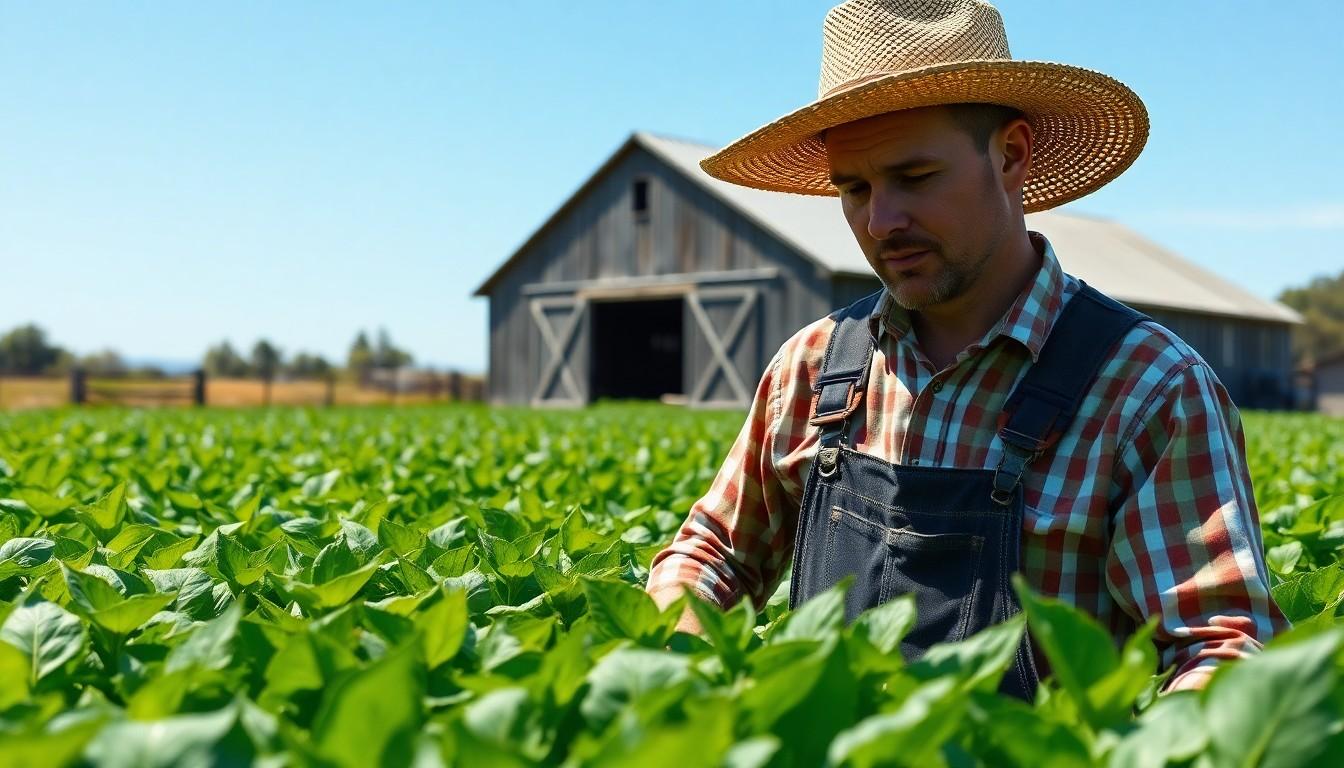Organic farming often gets a gold star for its eco-friendly approach and health benefits, but it’s not all sunshine and rainbows. Beneath the surface of those lush green fields lies a world of challenges that can make even the most dedicated farmer scratch their head. From pesky pests that dance on crops to the higher costs that can leave wallets feeling a little lighter, the cons of organic farming are worth a closer look.
While the idea of farming without synthetic fertilizers sounds appealing, the reality can be a bit of a mixed bag. It’s like trying to bake a cake without sugar; you might end up with something that looks good but tastes a bit off. So, let’s dig into the not-so-glamorous side of organic farming and uncover what those who take the plunge might not tell you.
Organic Farming Cons
Organic farming prioritizes environmental health and sustainable practices. It relies heavily on natural processes and materials for growing crops and raising livestock. This method often avoids synthetic pesticides and fertilizers, which poses challenges in pest management. Farmers face increased risks of crop damage due to pests that these synthetic alternatives would typically control.
Costs are another significant concern. Organic products usually demand higher prices, reflecting the labor-intensive processes and lower yields often experienced in organic farming. Implementing organic practices can require more time and effort, making it less financially viable for many farmers.
Soil fertility management varies in organic systems. While organic methods promote soil health through composting and cover cropping, achieving the same nutrient levels as conventional farming remains difficult. Farmers must adopt diverse crop rotations, which can complicate planning and execution.
Accessing organic seeds and inputs presents additional challenges. Availability may be limited, as many conventional seed varieties are not certified organic. As a result, farmers may struggle to find the right genetics for their specific needs.
Labor requirements tend to be higher in organic farming. More hands-on involvement is essential to manage weeds and pests without chemical assistance. This demand for labor can be a barrier for those operating on smaller scales or with limited resources.
Navigating regulations adds another layer of complexity. Organic certification processes can be strict and time-consuming. Farmers must maintain detailed records and adhere to specific standards, which can feel overwhelming.
Despite its eco-friendly reputation, organic farming presents challenges and drawbacks that deserve careful consideration. Each aspect, from pest management to labor demands, reflects the complexities of pursuing organic methods in today’s agricultural landscape.
Economic Challenges

Organic farming presents notable economic challenges that impact its viability. Financial considerations play a significant role in the decision-making process for farmers.
Higher Production Costs
Production costs are generally higher in organic farming compared to conventional farming. Labor-intensive practices contribute significantly to these elevated expenses. Expenses related to organic certification also add to the financial burden. Additionally, organic inputs such as seeds and fertilizers may come with a premium price tag. Consequently, these factors can impact the overall profitability of organic farms. Farmers often face challenges in maintaining competitive pricing in the marketplace. For consumers, this means that organic products typically cost more, making accessibility a concern.
Market Accessibility Issues
Market accessibility presents another challenge for organic farmers. Limited distribution channels often restrict their ability to reach consumers effectively. Competition remains fierce, with conventional products dominating the market. Consequently, organic farmers frequently struggle to secure shelf space in retail outlets. Additionally, fluctuating demand for organic products can create uncertainty. Some regions lack sufficient infrastructure to support organic farming. Farmers must navigate these complexities while striving for steady sales and growth.
Environmental Considerations
Organic farming has various environmental implications that merit attention. These challenges affect both the ecosystem and the agricultural landscape.
Reduced Crop Yields
Yield levels in organic farming can be significantly lower than in conventional methods. Research shows that organic farms often produce 20 to 50 percent less than conventional farms. Crop rotation and soil management complicate efforts to boost productivity. Limited access to organic seeds may reduce options for crop diversity as well. Factors like pests and diseases can amplify yield disparities, making it more difficult for farmers to achieve consistent outputs. The focus on sustainability may inadvertently sacrifice immediate production levels.
Pest and Disease Management
Managing pests and diseases in organic farming presents particular hurdles. Organic practices restrict the use of synthetic pesticides, increasing vulnerability to infestations. Farmers often rely on natural alternatives, which might not provide the same efficacy as chemical solutions. Crops can suffer from higher rates of disease without timely intervention. Timing becomes crucial; with limited options, the ability to respond swiftly to outbreaks decreases. Ultimately, navigating these challenges requires more labor and creativity, yet risks to crop health escalate in the absence of conventional methods.
Social Implications
Organic farming carries social implications that extend beyond agricultural practices. Communities often feel the effects of organic farming’s challenges, particularly in labor requirements and skill development.
Labor Requirements
Labor demands are notably higher in organic farming. More hands-on involvement is essential to manage pests and weeds without chemicals, leading to increased time and effort. Farmers need a larger workforce to maintain sustainable practices and meet the necessary standards for organic certification. The reliance on labor-intensive methods can strain local labor markets, particularly in regions with limited workforce availability. Furthermore, farmers may struggle to find skilled workers who understand organic practices, complicating operations and productivity.
Knowledge and Skill Gaps
Knowledge and skill deficiencies pose significant challenges. Many farmers transitioning to organic methods require training in sustainable practices and pest management techniques. Limited resources for obtaining this knowledge can hinder effective learning and adaptation. Understanding soil health and crop rotation strategies is crucial for successful organic farming. Bridging these skill gaps often necessitates investment in educational programs, which may not always be accessible or affordable for all farmers. As a result, communities may face disparities in access to information and quality farming practices, ultimately impacting the viability of local organic operations.
Consumer Perceptions
Consumer perceptions of organic farming play a significant role in shaping market dynamics. Misunderstandings about the benefits and limitations of organic products abound.
Misconceptions About Organic Products
Many consumers believe organic products are inherently healthier. This notion often stems from marketing that emphasizes the absence of synthetic chemicals. In reality, research indicates that organic produce often contains nutrient levels comparable to conventional crops. Furthermore, consumers sometimes assume organic farming is entirely pesticide-free. Organic standards allow for certain natural pesticides which can still affect crop health. Misconceptions like these can lead to unrealistic expectations about organic farming practices.
Price Sensitivity Among Consumers
Price sensitivity significantly impacts consumer purchasing decisions in organic markets. Many consumers perceive organic products as premium-priced due to perceived health benefits. Data shows that organic prices can be 20 to 100 percent higher than conventional options. Despite recognition of health benefits, price remains a barrier for some buyers. Shoppers often weigh these costs against their household budgets. Thus, even individuals committed to sustainability may limit organic purchases due to financial constraints.
Viability and Success
Organic farming offers a compelling vision of sustainability but comes with its own set of challenges. Farmers face higher costs and labor demands that can strain resources and profitability. The complexities of pest management and soil fertility add layers of difficulty that aren’t always apparent to consumers.
Additionally the misconceptions surrounding organic products can lead to unrealistic expectations. While the intent behind organic farming is noble its practical implications require thorough understanding and consideration. As the industry evolves addressing these challenges will be crucial for its long-term viability and success.

